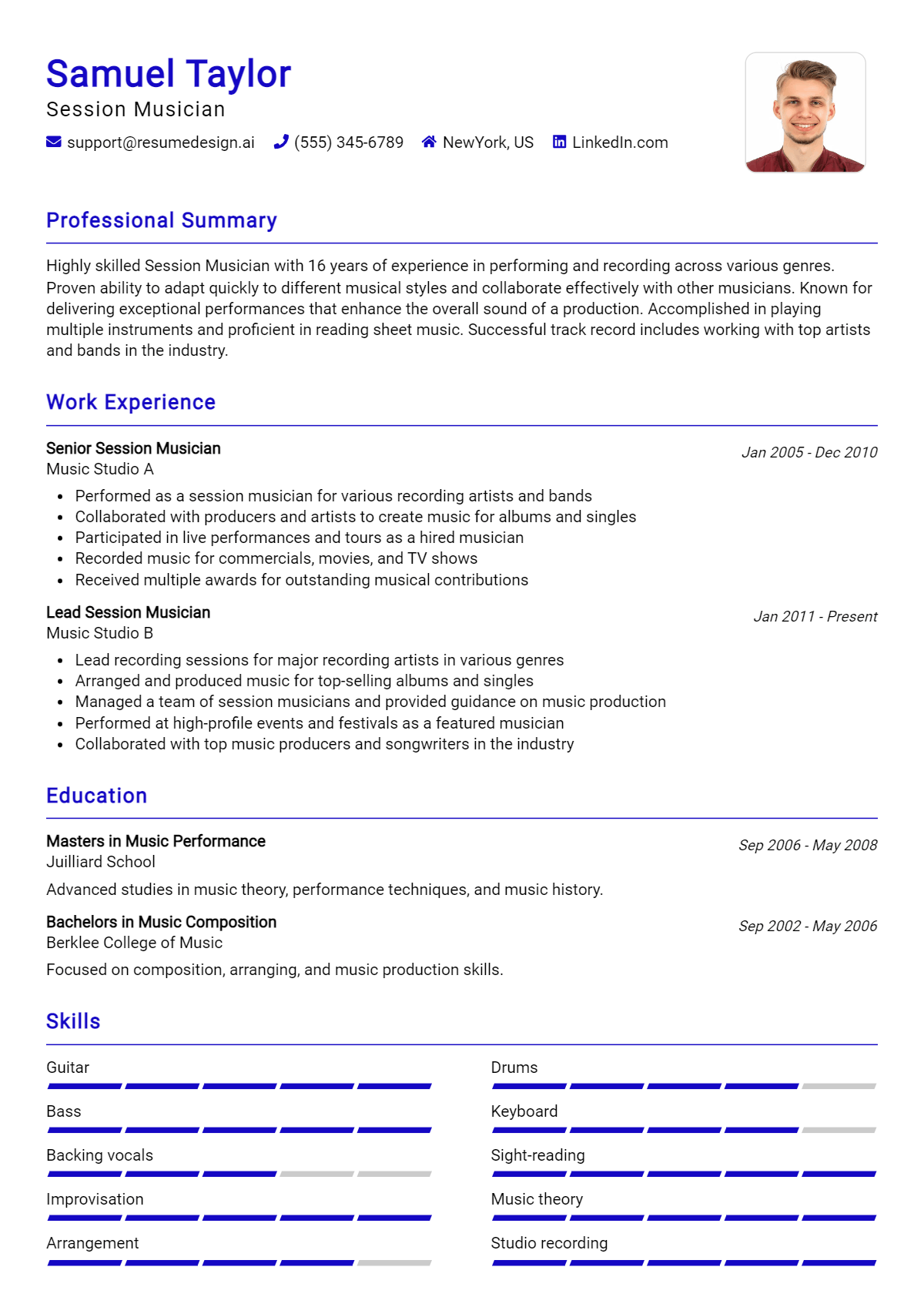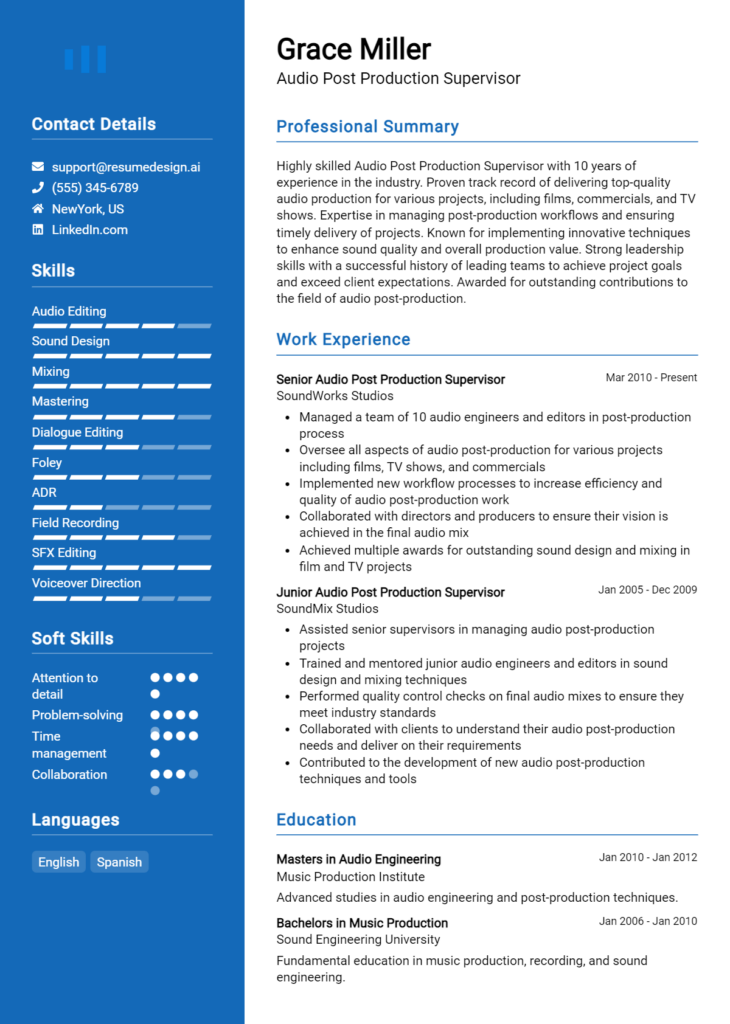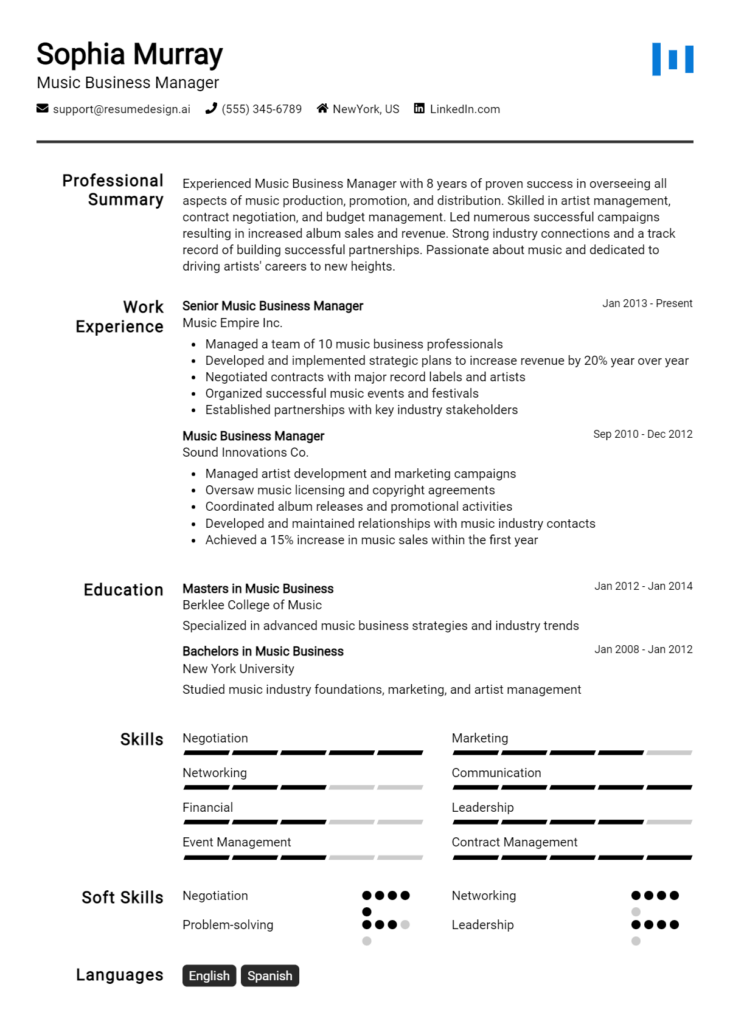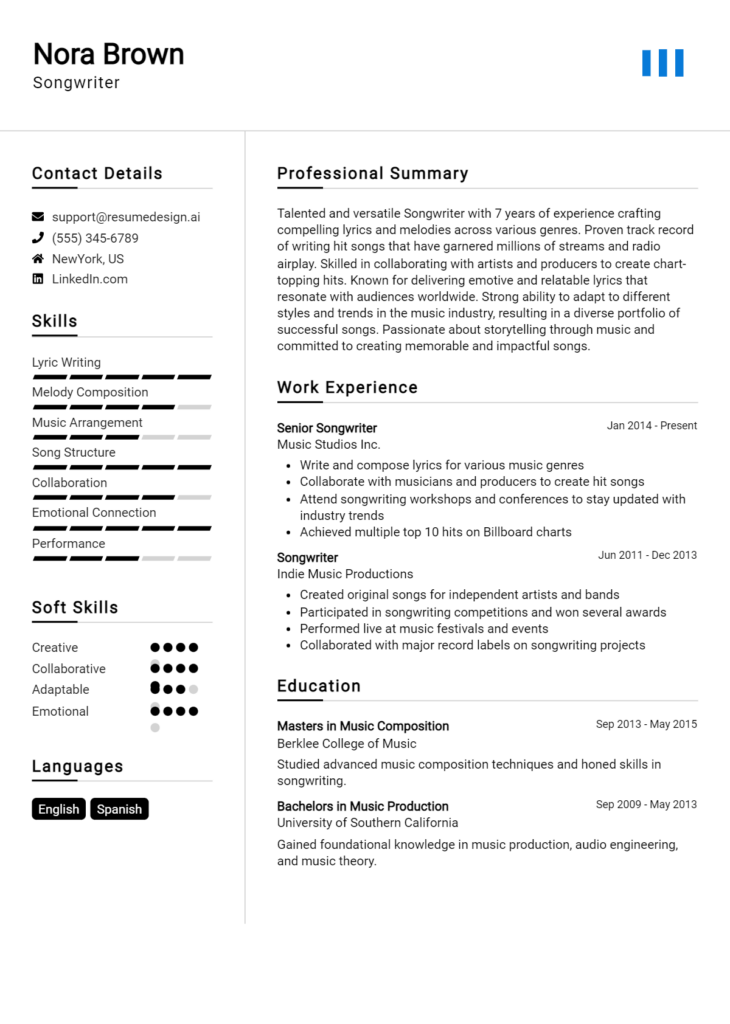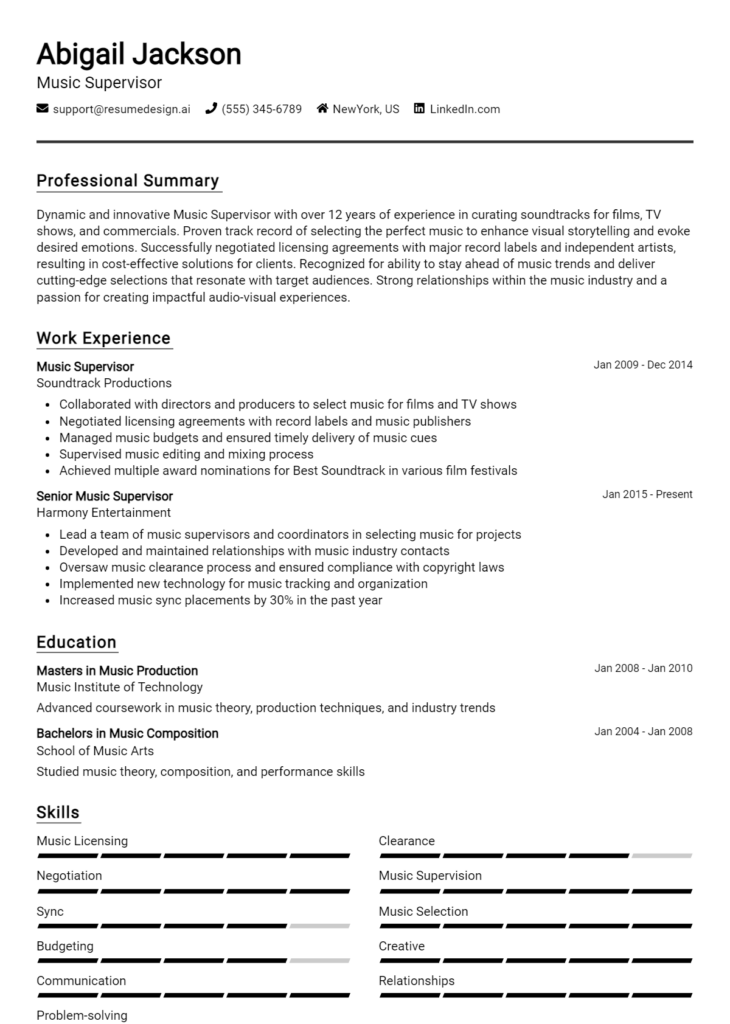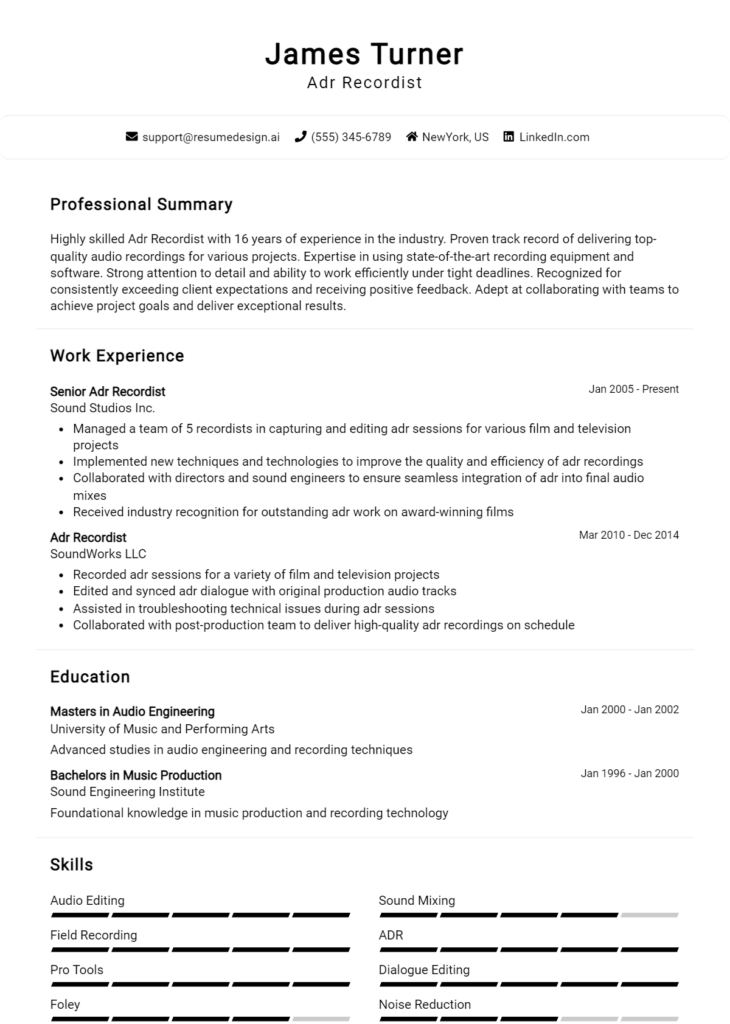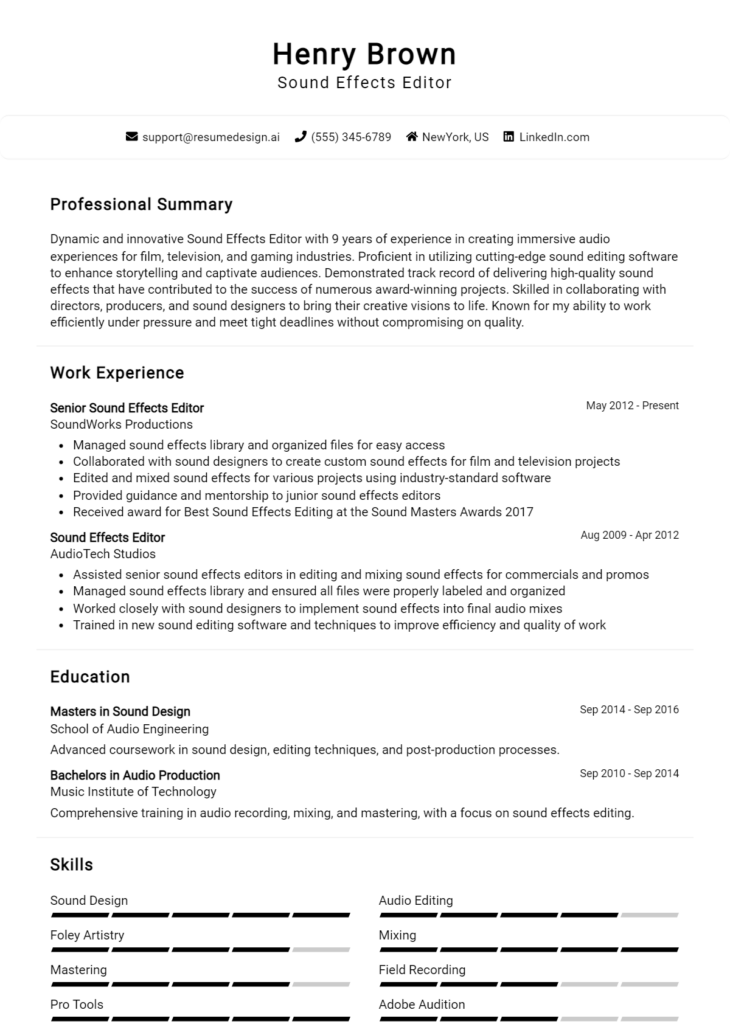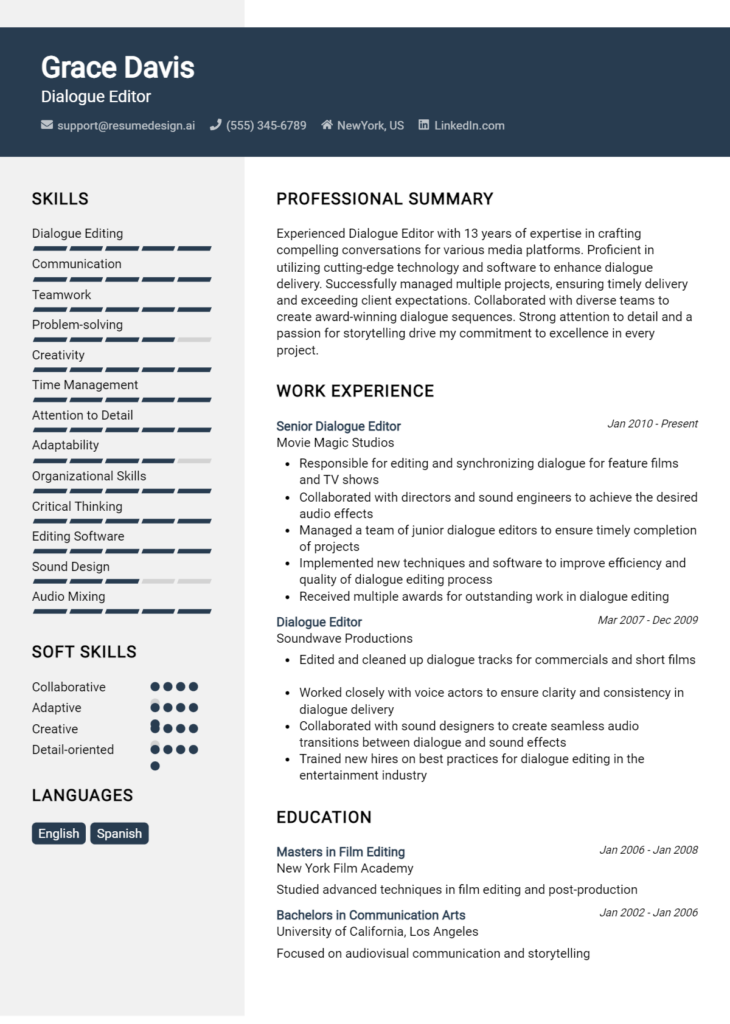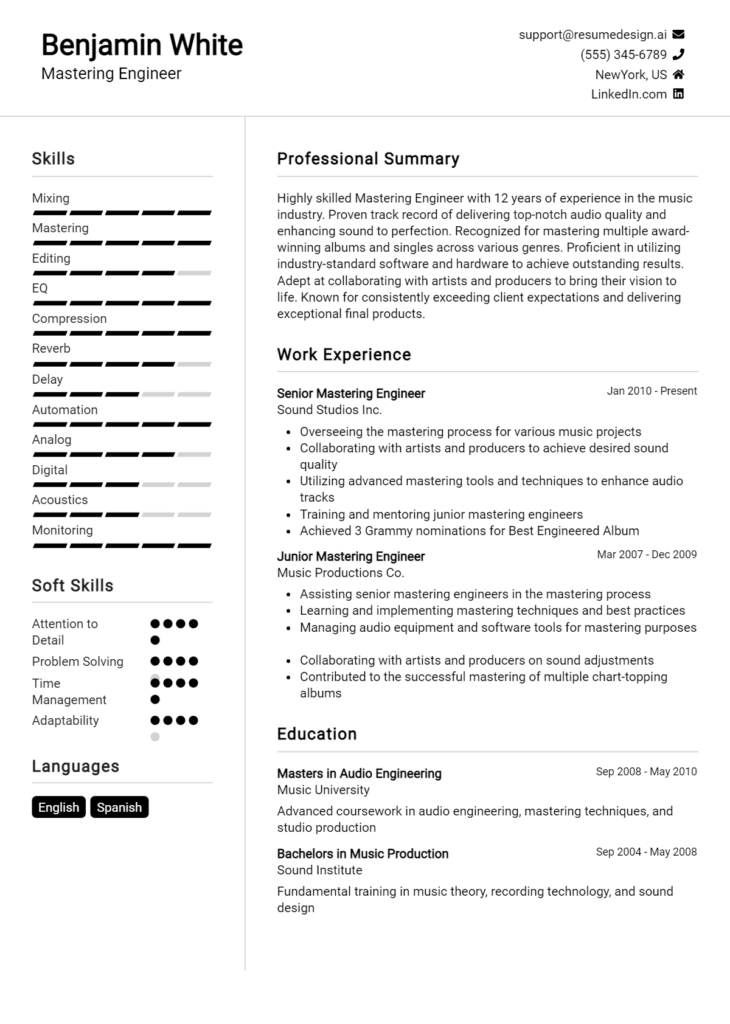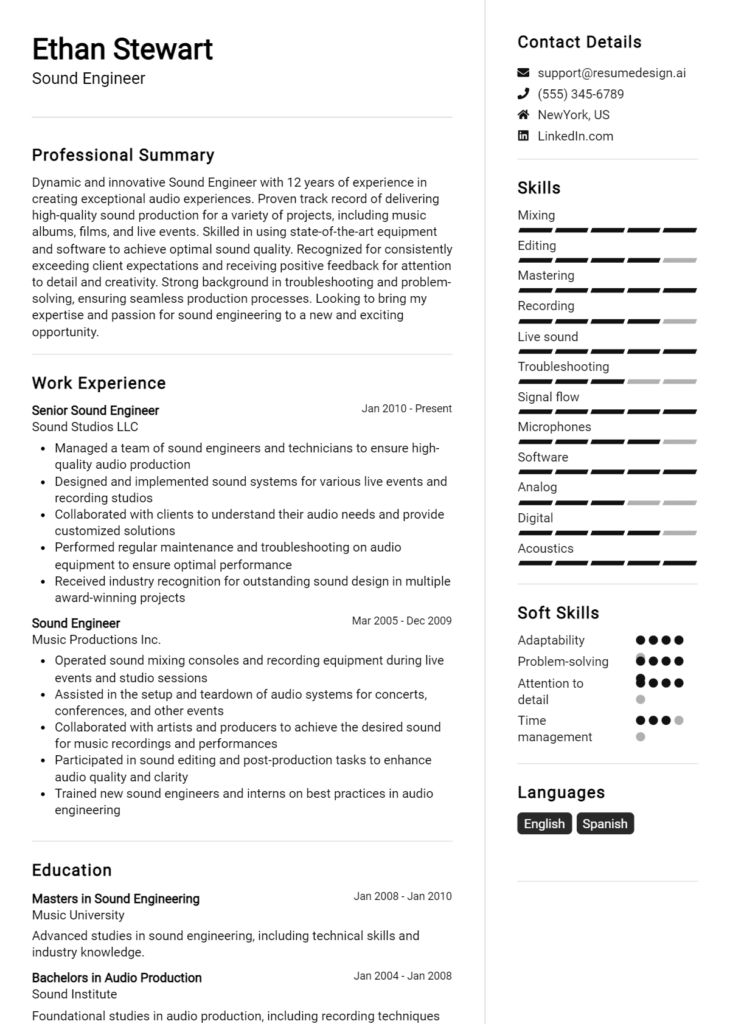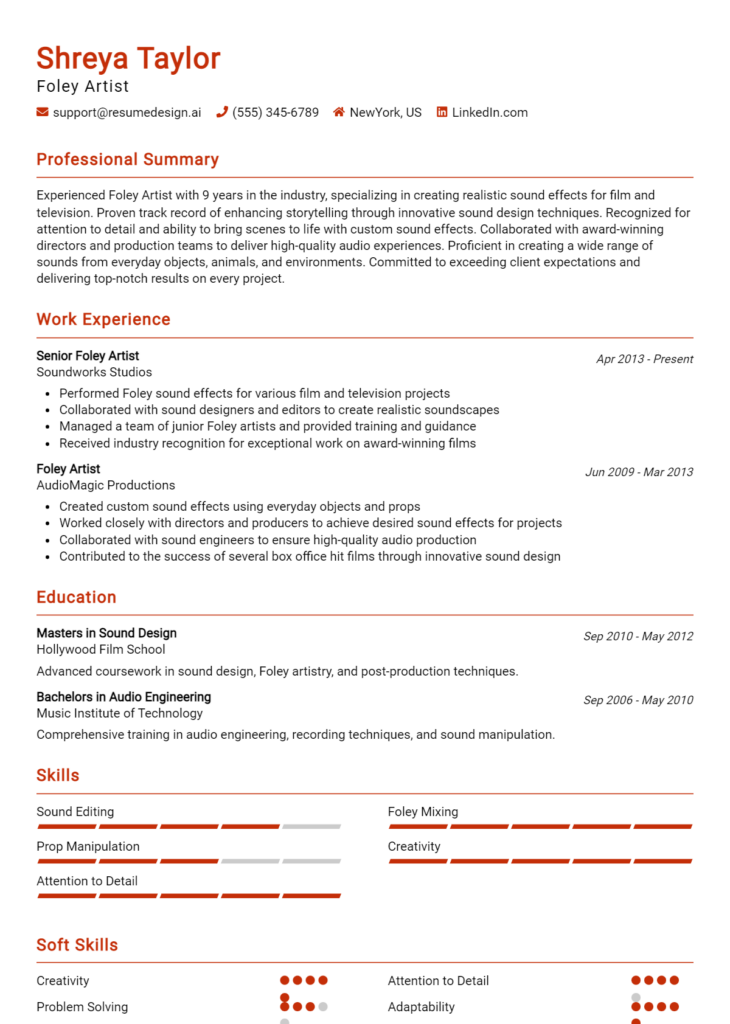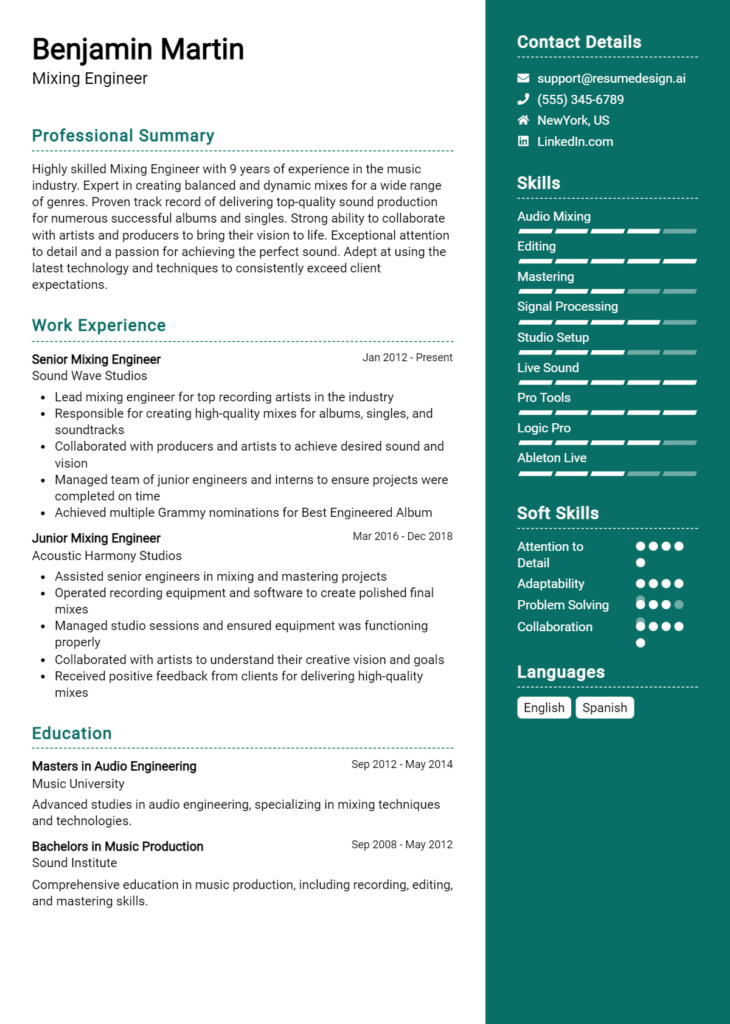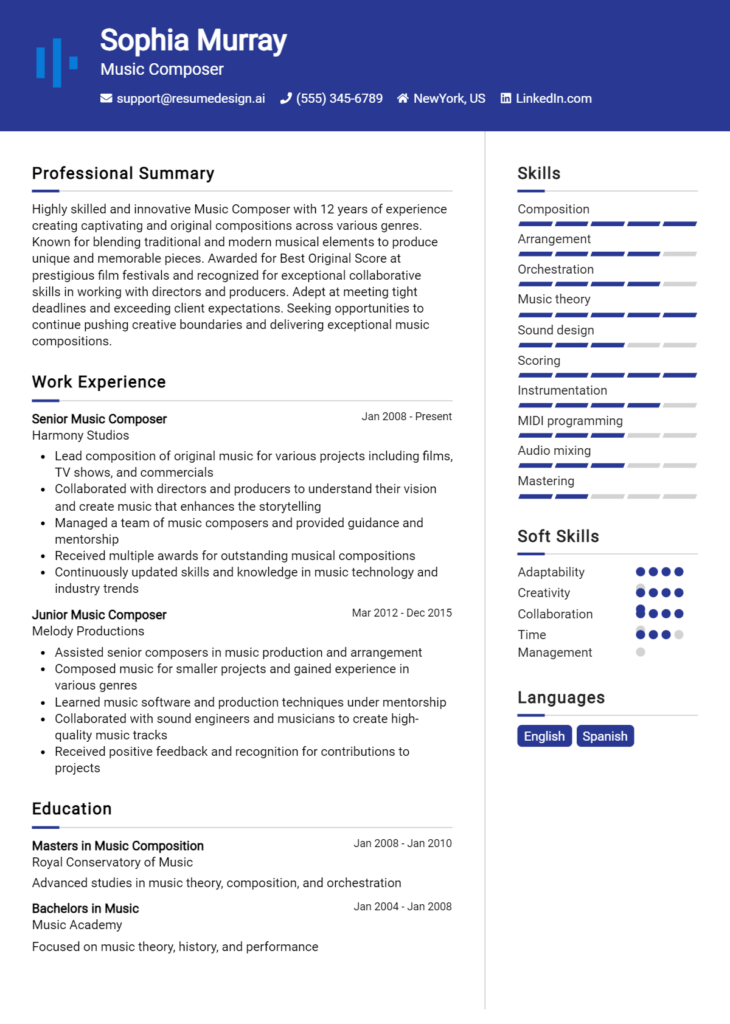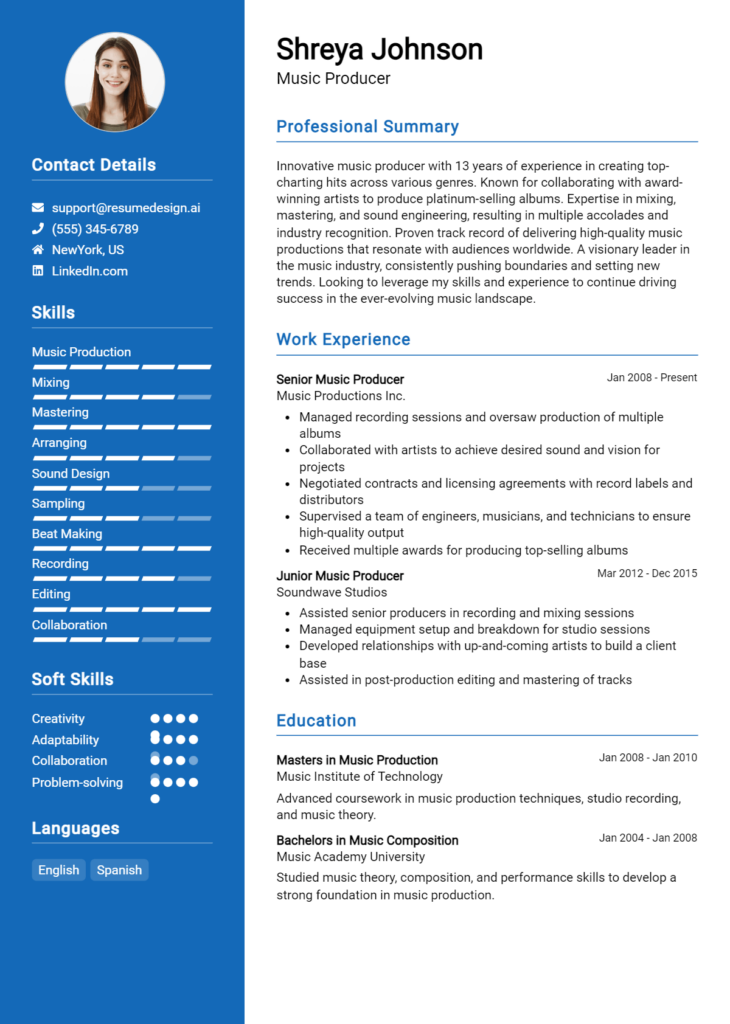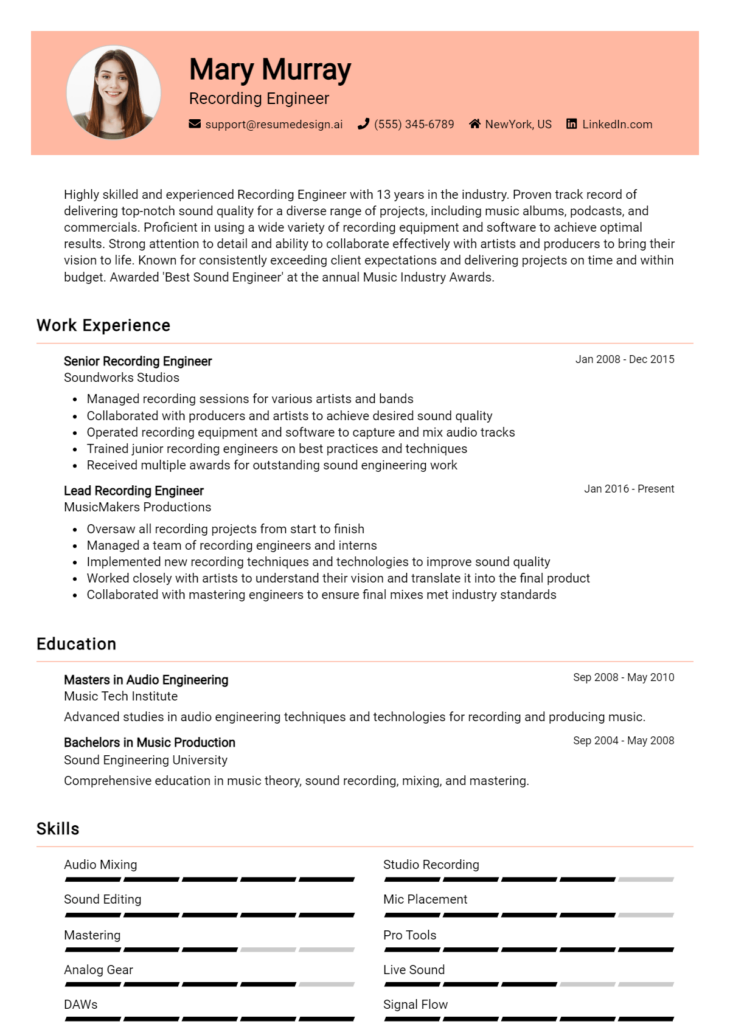Session Musician Core Responsibilities
A Session Musician is essential in bridging the gap between various departments in the music industry, contributing to recording sessions, live performances, and collaborative projects. Key responsibilities include mastering different musical styles, adapting to various recording environments, and quickly learning new material. Technical skills in instrument proficiency, operational efficiency in studio settings, and problem-solving abilities to overcome challenges are vital. A well-structured resume can effectively highlight these qualifications, showcasing a musician's versatility and alignment with an organization's goals.
Common Responsibilities Listed on Session Musician Resume
- Performing a variety of musical styles on multiple instruments.
- Collaborating with producers, songwriters, and other musicians.
- Reading and interpreting sheet music or chord charts.
- Recording tracks in studio sessions under tight deadlines.
- Adapting to different genres and artistic visions.
- Providing creative input and musical arrangements.
- Maintaining high-quality sound and performance standards.
- Participating in rehearsals and live performances.
- Communicating effectively with team members and clients.
- Preparing for sessions by practicing and reviewing material.
- Problem-solving technical issues during recording sessions.
- Building and maintaining professional relationships in the industry.
High-Level Resume Tips for Session Musician Professionals
In the competitive world of music, a well-crafted resume is essential for Session Musicians looking to make a mark. Often, a resume serves as the first impression a candidate makes on potential employers, so it must effectively showcase both skills and achievements. A strong resume not only highlights your musical talents but also reflects your versatility and adaptability in various settings. This guide will provide practical and actionable resume tips specifically tailored for Session Musician professionals, helping you stand out in a crowded industry.
Top Resume Tips for Session Musician Professionals
- Tailor your resume to the specific job description, emphasizing the skills and experiences that align with the role.
- Showcase relevant experience by listing notable collaborations, performances, and recordings that demonstrate your versatility.
- Quantify your achievements where possible, such as the number of projects completed, styles mastered, or notable artists you've worked with.
- Highlight industry-specific skills, including proficiency with various instruments, styles, and music software.
- Incorporate links to your online portfolio or recordings to provide potential employers with easy access to your work.
- Use clear and concise language that effectively communicates your musical journey and accomplishments.
- Consider including testimonials or quotes from artists you've collaborated with to add credibility to your experience.
- Keep the format clean and professional, ensuring that your resume is easy to read and visually appealing.
- Be mindful of the length; aim for one page, focusing on the most relevant and impactful information.
By implementing these tips, you can significantly increase your chances of landing a job in the Session Musician field. A polished and targeted resume not only showcases your talents but also demonstrates your professionalism and understanding of the industry, making you a more attractive candidate to potential employers.
Why Resume Headlines & Titles are Important for Session Musician
In the competitive world of music, a session musician's resume must stand out among countless applicants. This is where the importance of resume headlines and titles comes into play. A strong headline or title can immediately grab the attention of hiring managers, summarizing a candidate's key qualifications in a single, impactful phrase. By crafting a concise and relevant headline that reflects the specific role being applied for, musicians can create a powerful first impression that encourages further exploration of their resume. This initial hook is crucial in a field where talent and experience must be communicated effectively and swiftly.
Best Practices for Crafting Resume Headlines for Session Musician
- Keep it concise: Aim for one impactful phrase, ideally under 10 words.
- Be role-specific: Tailor the headline to the specific session musician position you are applying for.
- Highlight key strengths: Focus on your most marketable skills or experiences.
- Use industry keywords: Incorporate terms commonly associated with session musicians to enhance visibility.
- Avoid vague language: Steer clear of generic phrases that do not convey your unique qualifications.
- Showcase versatility: If applicable, mention diverse genres or instruments to attract a broader range of opportunities.
- Make it impactful: Use action words or strong adjectives to convey confidence and professionalism.
- Revise for clarity: Ensure the headline communicates your value clearly and succinctly.
Example Resume Headlines for Session Musician
Strong Resume Headlines
Versatile Session Musician Specializing in Rock and Jazz
Award-Winning Guitarist with 10+ Years of Studio Experience
Dynamic Vocalist and Multi-Instrumentalist for Hire
Experienced Session Drummer with a Proven Track Record in Diverse Genres
Weak Resume Headlines
Musician Looking for Work
Session Musician with Experience
The strong headlines are effective because they convey specific skills, experiences, and unique qualities that make the candidate an attractive choice for hiring managers. They utilize impactful language and clear descriptors that highlight the musician's strengths and versatility. In contrast, the weak headlines fail to impress because they are vague, generic, and lack the specificity needed to capture attention. By avoiding such pitfalls, candidates can ensure their resumes begin with a powerful statement that resonates with potential employers.
Writing an Exceptional Session Musician Resume Summary
A well-crafted resume summary is crucial for a Session Musician, as it serves as the first impression for hiring managers who sift through numerous applications. A strong summary succinctly highlights the candidate's key skills, relevant experience, and notable accomplishments, immediately capturing attention and demonstrating the unique value they bring to the table. In a competitive field where collaboration and adaptability are paramount, an impactful summary can differentiate a musician from others vying for the same role. It should be concise, powerful, and tailored specifically to the job at hand, ensuring that it resonates with the requirements outlined in the job description.
Best Practices for Writing a Session Musician Resume Summary
- Quantify achievements by including specific metrics, such as the number of projects completed or notable artists collaborated with.
- Focus on relevant skills that align with the job description, such as proficiency in various instruments or styles.
- Tailor the summary for each application, reflecting the specific requirements and preferences of the hiring manager.
- Highlight unique experiences, such as live performances or recording sessions that set you apart from other candidates.
- Use action verbs to convey a sense of energy and initiative, making the summary more engaging.
- Keep it concise, ideally within 2-4 sentences, to maintain the reader’s interest.
- Incorporate industry-specific terminology to demonstrate familiarity and expertise in the field.
- Showcase versatility by mentioning a range of styles or genres you are comfortable with.
Example Session Musician Resume Summaries
Strong Resume Summaries
Versatile session musician with over 10 years of experience collaborating with renowned artists across genres, including pop, rock, and jazz. Successfully recorded on over 30 albums, contributing to projects that have sold over 2 million copies worldwide.
Professional guitarist with a proven track record of live performances in over 200 shows, including major festivals and tours. Recognized for delivering high-energy sets and seamlessly adapting to various musical styles, enhancing audience engagement.
Highly skilled session drummer with expertise in both studio and live environments, having played on numerous tracks that achieved Billboard chart success. Known for exceptional timing and creativity, contributing to a diverse range of music from indie to electronic.
Weak Resume Summaries
I am a musician with experience and skills in different areas of music.
Talented artist looking for opportunities in music. I play various instruments and have worked with some bands.
The strong resume summaries are effective because they provide specific details about achievements, including quantifiable results and relevant skills that highlight the candidate's qualifications. They paint a clear picture of the musician's abilities and experiences, making them stand out. Conversely, the weak summaries lack specificity and do not provide any measurable outcomes or unique attributes, resulting in a generic impression that fails to engage hiring managers.
Work Experience Section for Session Musician Resume
The work experience section of a Session Musician resume is crucial as it effectively showcases the candidate's technical skills, team management capabilities, and commitment to delivering high-quality musical products. This section provides potential employers with tangible evidence of a musician's experience in various settings, demonstrating their proficiency in instrumentation, collaboration with other artists, and ability to meet industry standards. By quantifying achievements and aligning experiences with the expectations of the music industry, candidates can present themselves as competitive and capable professionals who can contribute significantly to any musical project.
Best Practices for Session Musician Work Experience
- Highlight specific instruments and technical skills relevant to your sessions.
- Quantify achievements, such as the number of projects completed or audience size for live performances.
- Include collaborative projects with notable artists or bands to enhance credibility.
- Detail your role in each project to clarify leadership and teamwork responsibilities.
- Use industry-standard terminology to resonate with hiring managers.
- Focus on results-driven outcomes, such as increased sales, streaming numbers, or audience engagement.
- Tailor your experiences to fit the specific job you are applying for.
- Keep descriptions concise yet informative, emphasizing key contributions.
Example Work Experiences for Session Musician
Strong Experiences
- Collaborated with Grammy-winning producer on a chart-topping album, contributing guitar and vocal arrangements that led to a 25% increase in streaming revenue.
- Served as lead guitarist for a national tour with a major artist, performing in front of audiences exceeding 10,000 and receiving positive reviews from industry publications.
- Provided session work for a popular TV series soundtrack, resulting in a nomination for a prestigious music award.
- Worked alongside a diverse group of musicians to produce a multi-genre EP that gained over 1 million plays on various streaming platforms within six months.
Weak Experiences
- Played at various local gigs.
- Worked on some recording projects.
- Performed with different bands.
- Provided music for a few events.
The examples listed as strong experiences effectively demonstrate quantifiable outcomes, technical leadership, and collaboration, showcasing specific achievements that align with industry success. In contrast, the weak experiences lack detail and impact, providing vague descriptions that do not highlight the candidate's skills, contributions, or accomplishments in a compelling manner. By focusing on measurable results and meaningful collaborations, candidates can create a more powerful narrative in their resumes.
Education and Certifications Section for Session Musician Resume
The education and certifications section of a Session Musician resume is crucial as it showcases the candidate's academic achievements, relevant certifications, and commitment to ongoing professional development. This section allows candidates to demonstrate their foundational knowledge in music theory, performance techniques, and industry standards, which can significantly enhance their credibility in the competitive music landscape. By providing details about relevant coursework, specialized training, and certifications, applicants can align themselves with the expectations of potential employers, ultimately presenting themselves as well-rounded and dedicated professionals in their field.
Best Practices for Session Musician Education and Certifications
- Focus on relevance: List degrees and certifications that directly relate to music performance, production, or composition.
- Be specific: Include the names of institutions and years of attendance to add credibility to your qualifications.
- Highlight advanced credentials: If applicable, emphasize any advanced degrees or specialized certifications that distinguish you from other candidates.
- Include relevant coursework: Mention specific courses that provided essential skills or knowledge applicable to session work.
- Certifications from recognized bodies: Prioritize certifications from reputable organizations or institutions within the music industry.
- Showcase ongoing education: List any workshops, masterclasses, or online courses that illustrate your commitment to continuous learning.
- Use a clear format: Ensure that the section is organized and easy to read, using bullet points or tables for clarity.
- Tailor to the job: Adapt the content of this section to reflect the requirements of the specific session musician role you are applying for.
Example Education and Certifications for Session Musician
Strong Examples
- Bachelor of Music in Performance, Berklee College of Music, 2018
- Certificate in Music Production, SAE Institute, 2020
- Completed coursework in Advanced Music Theory and Arranging, University of Southern California, 2019
- Certified Pro Tools User, Avid Technology, 2021
Weak Examples
- High School Diploma, Springfield High School, 2015
- Certificate in Basic Piano Skills, Local Community Center, 2016
- Completed a course in Music Appreciation, Online Course, 2017
- Self-taught musician with no formal education or certifications.
The strong examples are considered effective because they reflect relevant educational achievements and certifications that align directly with the skills required for a session musician. They demonstrate an advanced understanding of music and production, which is essential in this role. In contrast, the weak examples lack relevance and do not provide evidence of specialized skills or a comprehensive educational background in music, making them less impactful for prospective employers.
Top Skills & Keywords for Session Musician Resume
As a session musician, your resume serves as a crucial tool for showcasing your unique talents and abilities to potential employers. The music industry is competitive, and having a well-crafted resume that highlights your skills can set you apart from other candidates. Skills are not just about technical proficiency; they also encompass interpersonal qualities that demonstrate your ability to collaborate and adapt in various musical environments. A strong combination of both hard and soft skills will not only enhance your resume but also position you as a versatile and valuable asset in any recording studio or live performance setting.
Top Hard & Soft Skills for Session Musician
Soft Skills
- Communication
- Collaboration
- Adaptability
- Creativity
- Problem-Solving
- Time Management
- Emotional Intelligence
- Reliability
- Attention to Detail
- Professionalism
- Networking
- Open-mindedness
- Conflict Resolution
- Patience
- Work Ethic
Hard Skills
- Proficiency in multiple instruments
- Music theory knowledge
- Sight-reading ability
- Arranging and composing
- Recording software expertise (e.g., Pro Tools, Logic Pro)
- Live performance techniques
- Understanding of various genres
- MIDI programming
- Audio engineering basics
- Music notation software proficiency
- Improvisation skills
- Transcription abilities
- Sound design
- Familiarity with studio equipment
- Mixing techniques
- Ability to follow a conductor or lead musician
For more insights on how to showcase your skills and effectively format your work experience, be sure to explore additional resources to enhance your resume.
Stand Out with a Winning Session Musician Cover Letter
Dear [Hiring Manager's Name],
I am writing to express my enthusiasm for the Session Musician position advertised [where you found the job listing]. With over [number] years of experience in the music industry, I have honed my skills across various genres, including rock, jazz, pop, and classical. My ability to adapt quickly and seamlessly to different musical styles, along with my proficiency in [specific instruments you play], makes me a strong candidate for this role. I am passionate about creating music that resonates with audiences and believe my versatility can contribute significantly to your projects.
Throughout my career, I have had the privilege of collaborating with a diverse range of artists and producers. My work has spanned from recording sessions in studios to live performances, and I have developed a reputation for my reliability, professionalism, and creative input. I find great joy in contributing to a team environment, where I can bring ideas to life while also supporting the artistic vision of others. My experience working under tight deadlines has also taught me the importance of effective communication and adaptability, ensuring that I can deliver high-quality work even in high-pressure situations.
I am particularly excited about the opportunity to work with [specific artists, producers, or projects related to the company] as I believe my musical style aligns well with your innovative approach. I am eager to bring my unique sound and collaborative spirit to your team, helping to create memorable music that stands out in today’s dynamic landscape. I would be thrilled to discuss how my background and skills can be an asset to your upcoming projects.
Thank you for considering my application. I am looking forward to the possibility of contributing to your talented team as a Session Musician. I am available for an interview at your earliest convenience and can be reached at [your phone number] or [your email address].
Warm regards,
[Your Name]
Common Mistakes to Avoid in a Session Musician Resume
When crafting a resume as a session musician, it's crucial to present your skills and experiences in a manner that highlights your versatility and professionalism. However, many aspiring session musicians fall into common traps that can undermine their chances of landing coveted gigs. Identifying and avoiding these mistakes can significantly improve the effectiveness of your resume and enhance your appeal to potential clients and producers.
Lack of Specificity: Failing to detail the instruments you play or the styles you specialize in can make your resume too generic. Be specific about your skills to attract the right opportunities.
Omitting Relevant Experience: Many musicians overlook the importance of including relevant gigs, even if they were unpaid or informal. Every performance contributes to your experience and showcases your versatility.
Ignoring Formatting: A cluttered or unprofessional-looking resume can detract from your qualifications. Use clear headings, bullet points, and consistent formatting to ensure readability.
Not Tailoring the Resume: Sending the same resume for every opportunity is a missed chance to connect. Tailor your resume to highlight experiences and skills that align with the specific session work you're applying for.
Neglecting Contact Information: Sometimes, musicians forget to include their contact details or provide outdated information. Ensure that your phone number and email address are current and easy to find.
Overlooking Testimonials or References: Including testimonials from producers, fellow musicians, or clients can add credibility to your resume. This social proof can be a powerful tool in establishing trust.
Using Jargon Without Explanation: While industry terms can demonstrate knowledge, using too much jargon without context can alienate potential clients unfamiliar with your background. Keep the language accessible while still showcasing expertise.
Failing to Showcase Online Presence: In today’s digital age, not including links to your portfolio, social media, or music samples can be a missed opportunity. Ensure you direct potential clients to where they can hear your work.
Conclusion
As a session musician, your primary role involves collaborating with various artists and producers to create high-quality recordings and performances. This dynamic position requires not only exceptional musical skills but also adaptability and professionalism in various genres and settings. Key points to consider include:
Versatility: Being able to play multiple instruments and adapt to different styles is crucial. Session musicians should be comfortable working across genres, whether it’s pop, rock, jazz, or classical.
Networking: Building relationships within the music industry can lead to more opportunities. Attend events, connect on social media, and engage with fellow musicians to expand your network.
Preparation: Always come prepared with knowledge of the tracks you'll be working on. This includes understanding the song structure, key signatures, and any specific notes or techniques required.
Professionalism: Arrive on time, communicate effectively, and be open to feedback. Your reputation as a reliable and talented musician can significantly impact your career.
Recording Skills: Familiarity with recording equipment and techniques can enhance your value as a session musician. Understanding the basics of sound engineering can help you deliver better performances.
In conclusion, if you're looking to enhance your career as a session musician, it’s essential to present yourself effectively through a well-crafted resume. Take a moment to review your Session Musician Resume and consider utilizing available resources to improve it. Check out resume templates, use the resume builder for a polished look, explore resume examples for inspiration, and don’t forget to create a compelling cover letter with the help of cover letter templates. Your next gig could be just around the corner, so invest the time to make your resume stand out!

